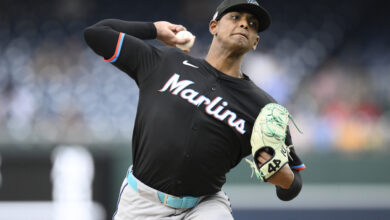
Second Straight Day of Labor Negotiation Yields Progress, Including Increased Minimum Salaries
Fine Print Might Be Less Hopeful
Though there’s still a very long way to go, Tuesday’s hourlong meeting between the Major League Baseball and the players union appears to have yielded at least a little progress toward an agreement. Players had already offered to drop their proposal for age-based free agency and revised revenue-sharing during Monday’s session, offering an olive branch of sorts. The latest session saw MLB drop its proposal to change arbitration, so it seems as though that process may remain the same moving forward.
While earlier free agency and curtailing service-time manipulation have been hallmarks of the players’ position, both topics are bigger as talking points and aren’t necessarily as impactful in practice. That isn’t to say they aren’t still big deals, it’s just that not as many players are directly affected by either process. Raising the minimum salary, however, would benefit nearly every player who comes into the league.
The only very rare exception would be those players who agree to extensions prior to accruing much service time, a practice that could gain steam in the future.
Max Scherzer’s deal got a lot of hype and Carlos Correa’s courtship will be the crown jewel of the post-lockout period, but the median salary has plummeted 30% from $1.65 million to $1.15 million since 2015. MLB also has the lowest minimum salary out of the three leagues referenced here, with its $570,500 floor falling well below $925,000 for the NBA, $750,000 for the NHL, and $660,000 for the NFL.
To that end, the MLBPA proposed an increase to a $750,000 minimum with a bonus pool funded by central revenue that would reward players with less than three years of service time who earn certain awards or WAR targets. The league has reportedly agreed to the bonus pool concept, but has only moved as high at $615,000 at this point. That’s up from $600,000 initially, though, so it’s a positive sign.
MLB also upped the minimum salary for players with 0-1 year of service time to 615k. Had previously offered 600k. https://t.co/jAdrLhwabJ
— Chelsea Janes (@chelsea_janes) January 25, 2022
I know it’s difficult for most people to sympathize with a labor force whose minimum salary is three-quarters of a million dollars, but think about it in terms of the huge number of players who won’t even get a full year in the show. Maybe it’s a guy who toils in the minors for years just to get a cup of coffee before being demoted again and eventually retiring with just two weeks in the league.
After making $25,000 or even less — much less in some cases — per season in the minors, getting 15 games in MLB might pay him around $69,000. That’s equivalent to nearly three years, maybe more, of what he’d been earning and would make a huge difference in the lives of those players who make up a much larger percentage of the overall workforce than all the Scherzers and Correas.
Given the union’s goal of getting more pay to players in their early years, a meaningful increase in pay for those pre-arb years would be a big win. Well, provided it doesn’t come with some sort of poison pill. Even with several other facets of the core economics — like the competitive balance tax level/penalties — left to debate, coming to an agreement on minimum pay would be a huge step toward reaching an accord on the CBA as a whole.
Update: After getting more information, perhaps MLB’s potential acquiescence to increased minimum salaries isn’t so positive after all. It appears as though the league is willing to raise the floor only if those salaries are locked in, meaning teams can’t offer raises even if they want to. That’s not great, Bob.
One of the more problematic MLB suggestions today from players' standpoint – and you'd think some teams' – was the idea that the minimum salary also will be a maximum: Teams can't pay above the salary for the specific service time even if they wanted to give a player a bump.
— Susan Slusser (@susanslusser) January 25, 2022

